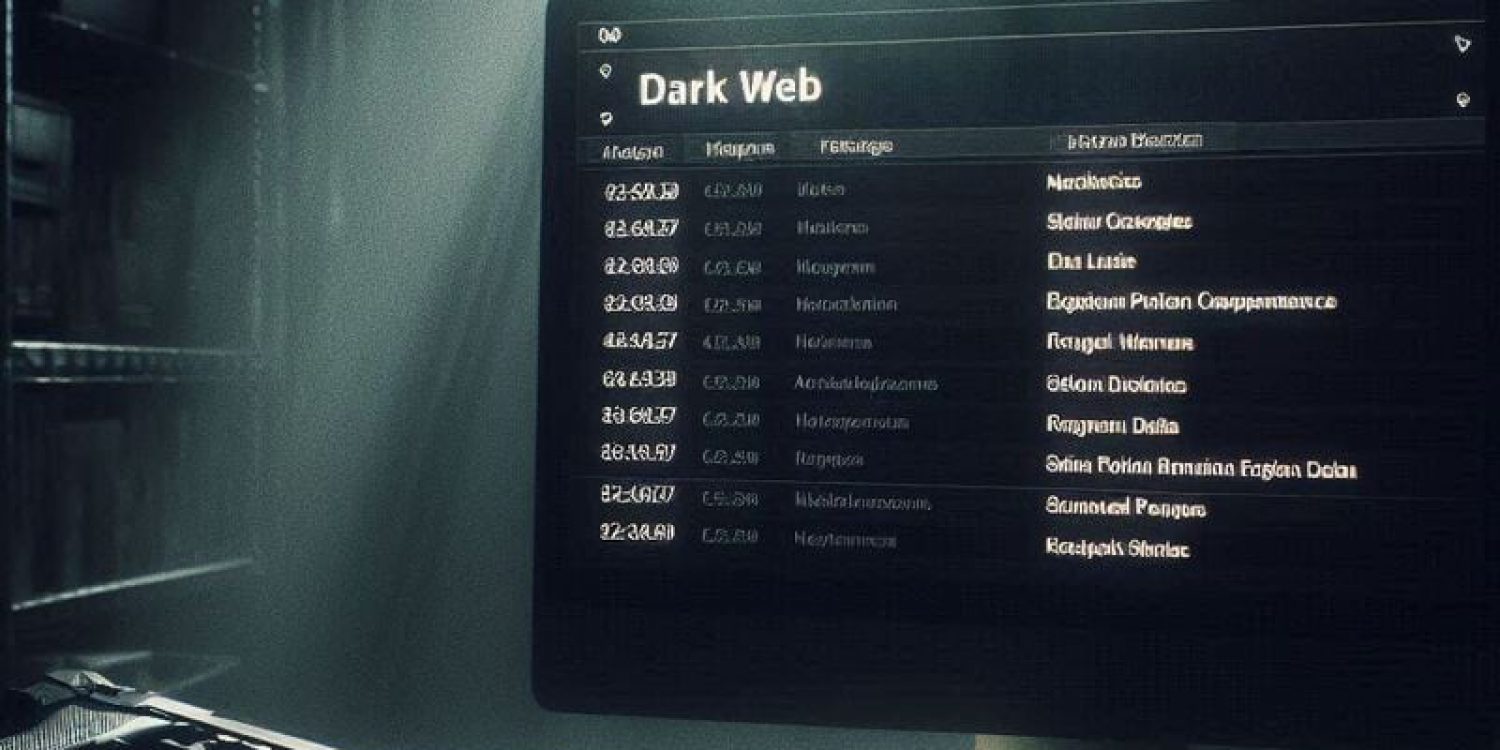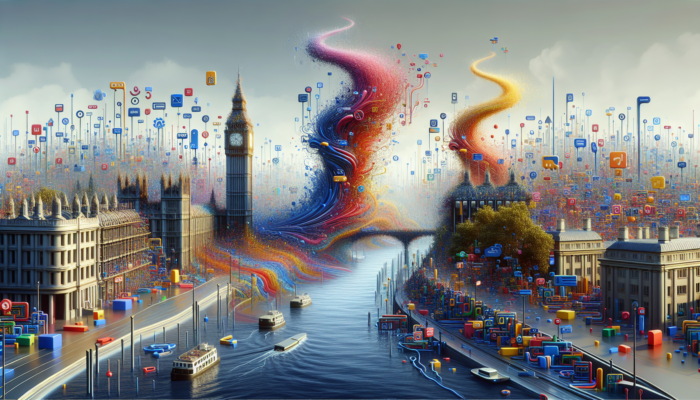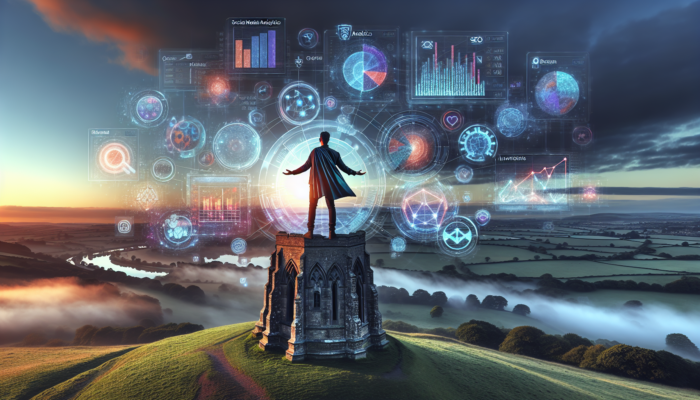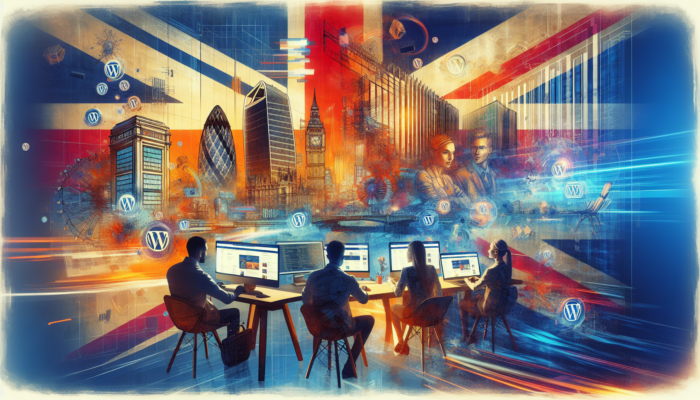Serving local customers for over 25 years.
Trusted by local business for reliable website design, SEO services and Digital Marketing in Somerset, Dorset, Devon, Wiltshire and Gloucestershire. 30 years of online marketing experience across the world.
Table of Contents
ToggleUnlocking the Secrets of Dark Web Investigations
The Dark Web represents a segment of the internet that eludes standard search engine indexing and necessitates specific software, configurations, or permissions to access. This concealed network provides users anonymity and untraceability, often exploited for illicit activities. Frequently linked to illegal operations, such as drug trafficking, arms sales, and human trafficking, the Dark Web also serves as a marketplace for cybercriminals who trade stolen personal information, credit card data, and other sensitive materials. Within these hidden corners, individuals can engage in unlawful transactions, seek out illicit forums, and connect with communities that operate outside the bounds of the law, all while feeling shielded from detection.
Operating on a unique architectural framework distinct from the surface web, the Dark Web effectively obscures users' identities through advanced encryption and multiple layers of anonymity. Access to this realm is commonly facilitated by specialized software like Tor (The Onion Router), which conceals users' online activities by routing their internet traffic through a network of volunteer-operated servers. This complex routing process makes it exceedingly difficult for anyone conducting network surveillance or traffic analysis to track a user's location or actions. While the Dark Web can provide a secure platform for whistleblowers and political dissidents to communicate, it is predominantly recognized for its association with criminal enterprises and illegal activities that pose severe challenges to law enforcement.
Key Insights for Understanding the Dark Web
- The Dark Web is a concealed segment of the internet that requires specific software for access and is frequently linked to unlawful activities.
- Engaging with the Dark Web poses significant threats, including identity theft, financial fraud, and exposure to explicit content.
- DarkSearch is a valuable tool that empowers users to navigate the Dark Web securely through its anonymous search engine capabilities.
- Users can encounter illicit products and services, stolen data, black market activities, and legitimate content on the Dark Web.
- Ensuring safety while exploring the Dark Web necessitates employing a secure VPN, exercising caution with links, and being judicious with personal data sharing.
Understanding the Risks Associated with the Dark Web
The Dark Web poses substantial risks to individuals and society at large. It is a hotbed for illicit activities, including the rampant sale of narcotics, firearms, and stolen personal information, which fuels the operations of criminal organizations. This environment also heightens the risk of identity theft, financial fraud, and other cybercrimes that can impact innocent users. The anonymity afforded by the Dark Web complicates the efforts of law enforcement agencies to pursue and prosecute offenders, providing cybercriminals with a false sense of security and impunity.
Moreover, the Dark Web significantly contributes to human trafficking and exploitation. Its unregulated and anonymous nature offers traffickers a haven to operate, resulting in a troubling increase in the online exploitation of vulnerable populations, particularly adolescents who may be coerced into prostitution or other forms of modern slavery. Additionally, the Dark Web is often a breeding ground for extremist ideologies and terrorist propaganda, posing severe threats to national security and public safety, which necessitates ongoing vigilance and proactive measures from society as a whole.
The extensive presence of illicit content and activities on the Dark Web engenders considerable societal repercussions. It fosters a culture of lawlessness that undermines the collective efforts to develop a safe and secure online environment. As such, it is crucial for users to be fully aware of the dangers of the Dark Web and to take proactive steps to safeguard themselves against its harmful impacts.

Safely Exploring the Dark Web with DarkSearch
DarkSearch is an innovative search engine designed to empower users to explore the Dark Web securely and privately. This tool allows individuals to search for specific content without jeopardizing their anonymity or personal privacy. DarkSearch utilizes robust encryption and privacy measures to ensure that users can navigate the Dark Web without fear of being tracked or monitored by malicious actors.
One of DarkSearch's standout features is its ability to provide users with a curated selection of verified and trustworthy Dark Web websites. This functionality helps individuals avoid stumbling upon illegal or potentially harmful content, redirecting them to reputable resources and information. Additionally, DarkSearch incorporates built-in security features to protect users from fraudulent sites and phishing scams, significantly reducing the risk of falling victim to cybercrime during their browsing experience.
Beyond its security enhancements, DarkSearch unlocks access to a wealth of information and resources unavailable on the surface web. This includes niche forums, marketplaces, and communities dedicated to various interests, allowing users to connect with like-minded individuals in a secure and private environment. By leveraging DarkSearch's capabilities, users can explore the Dark Web responsibly, steering clear of the risks associated with illegal activities while still tapping into valuable information and insights.

Discovering the Varied Content Available on the Dark Web
The Dark Web is home to a diverse array of both legitimate and illegal content and activities. Its notoriety largely stems from its role as a marketplace for illicit goods and services, including the trade of drugs, firearms, counterfeit currencies, and stolen personal information. This clandestine environment is beautiful to criminals seeking to conduct transactions while minimizing the risk of detection.
In addition to these illegal marketplaces, the Dark Web hosts forums and groups that cover a wide range of topics, such as hacking, cybercrime, political activism, and whistleblowing. These platforms provide individuals with a secure space to discuss controversial subjects and exchange information without the fear of censorship or surveillance. However, they can also serve as incubators for criminal behaviour and extremist views, posing significant threats to public safety and national security.
The Dark Web also fulfils important roles despite its association with illegal activities. It offers a secure avenue for whistleblowers and activists to share information and bring light to corruption and human rights abuses without fear of retribution. Furthermore, the Dark Web houses many resources and information that may be restricted or unavailable on the surface web, making it an invaluable tool for those seeking uncensored knowledge and alternative viewpoints.
Essential Safety Tips for Navigating the Dark Web
While navigating the Dark Web can present various risks, you possess the ability to safeguard yourself against potential dangers. Using specialized software such as Tor lets you browse the Dark Web securely. Tor encrypts your internet traffic, effectively concealing your location and online activities from any potential surveillance or traffic analysis, which empowers users with a sense of control over their privacy.
Caution is paramount when exploring the Dark Web. It is crucial to avoid clicking on unfamiliar links or downloading unexpected files, as the Dark Web is rife with malicious sites designed to steal sensitive information or inject malware into users' devices. By limiting your visits to trusted and verified websites, you can maintain your security while traversing this hidden digital landscape.
Additionally, individuals should refrain from sharing personal information or engaging in transactions on the Dark Web. The inherent anonymity of this environment complicates the verification of merchants or buyers, significantly increasing the risk of scams and fraud.
A virtual private network (VPN) can significantly enhance your security while exploring the Dark Web. A VPN encrypts your internet traffic and obscures your IP address, making it more challenging for malicious actors to trace or monitor your online behaviour.
By adhering to these safety tips and exercising caution during your Dark Web explorations, you can minimize your exposure to potential threats and protect yourself against the dangers of cybercrime.
Understanding Legal and Ethical Issues When Using DarkSearch
When utilizing DarkSearch or engaging with the Dark Web, individuals must be mindful of the legal and ethical implications. Accessing certain types of content or engaging in specific activities on the Dark Web may violate local laws or ethical standards, potentially leading to serious legal consequences or moral dilemmas.
One critical legal consideration when using DarkSearch is the risk of encountering unlawful content or activities. Users must understand that accessing illegal marketplaces or participating in criminal undertakings on the Dark Web can lead to severe legal repercussions, including prosecution and imprisonment. Exercising caution and adhering to local laws while exploring the Dark Web is vital to avoid unintentional legal violations.
Equally important is understanding the ethical implications of using DarkSearch. Users should know the dangers of engaging with harmful content or enabling illegal actions on the Dark Web. This includes avoiding transactions involving illicit goods or services, steering clear of participation in criminal enterprises, and promptly reporting any illegal activities encountered while exploring.
When accessing sensitive data or discussing contentious topics on the Dark Web, it is crucial to acknowledge the moral implications. Treating such subjects with care and empathy is essential, as it recognizes the potential impact on individuals or communities affected by these issues.
Individuals can navigate the Dark Web responsibly and safely by remaining vigilant and considering legal and ethical factors while using DarkSearch.

Anticipating the Future of the Dark Web: Implications and Innovations
The future landscape of the Dark Web is ripe with potential implications and advancements that could drastically shape its trajectory. As technology evolves, concerns are mounting regarding the likelihood of increasingly sophisticated cybercriminal activities on the Dark Web. Innovations in encryption methods, anonymization technologies, and decentralized networks may further complicate law enforcement's ability to monitor and control illegal activities in this hidden realm.
Additionally, the significance of international collaboration in tackling the challenges presented by the Dark Web cannot be underestimated. As illicit operations on the Dark Web frequently cross national borders, the necessity for cooperative actions among governments, law enforcement agencies, and technology firms becomes more critical than ever. This includes sharing intelligence, coordinating efforts, and establishing regulatory frameworks to mitigate the risks associated with the Dark Web, highlighting each entity's essential roles in addressing this global issue.
Moreover, ongoing discussions surrounding potential government interventions to combat unlawful activities on the Dark Web while safeguarding individual privacy rights are gaining traction. Balancing the need to address cybercrime with the imperative to protect freedom of expression and internet privacy is a complex challenge. As policymakers navigate these intricate considerations, they must prioritize informed decision-making to ensure that legislative measures effectively combat illegal activities on the Dark Web without infringing individual rights.
Future developments of the Dark Web will have profound implications for cybersecurity, law enforcement, personal privacy rights, and global security. By staying informed about potential trends and changes, individuals can better understand the evolving landscape of the Dark Web and take proactive steps to protect themselves from its associated threats.
Frequently Asked Questions About the Dark Web
What is a dark web search engine, and how does it function?
A dark web search engine is designed to help users navigate the dark web, a hidden segment of the internet not indexed by traditional search engines. This tool enables individuals to discover and access concealed websites and exclusive content typically unreachable through standard web browsers.
How do dark web search engines operate?
Dark web search engines utilize specialized algorithms to crawl and index content found within the dark web. These engines access hidden websites and retrieve information, making them searchable for users who wish to explore this concealed digital landscape more effectively.
Is using a dark web search engine considered legal?
Utilizing a dark web search engine is not inherently illegal, as it serves merely as a tool for accessing content on the dark web. However, users must recognize that the dark web is often linked to illegal activities, and engaging with certain content or participating in unlawful actions may violate the law.
What risks are associated with using a dark web search engine?
Several risks accompany the use of dark web search engines, including exposure to unlawful and harmful content, potential malware attacks, and the threat of being targeted by cybercriminals. Exercising caution and implementing appropriate security measures is crucial when accessing the dark web.
Can I access the dark web without utilizing a dark web search engine?
Technically, accessing the dark web without a search engine is possible using specialized software like Tor, which allows users to browse anonymously and reach hidden websites. However, using a dark web search engine can simplify finding specific content and enhance navigation through the dark web.
References:
Pros and Cons of Internet Usage – Good and Bad Effects. https://thetechprint.com/pros-and-cons-of-internet-usage
Is it Illegal to Access the Dark Web? – Exploring the Dark Corners of the Digital World: A Tale of Mexican Hackers. https://www.hackersmexicanos.com/is-it-illegal-to-access-the-dark-web/


















66 Comments
This exploration of the Dark Web sheds light on a complex and multifaceted aspect of our digital landscape that is often overshadowed by mainstream narratives. The anonymity granted by the Dark Web is indeed a double-edged sword, as it can facilitate both freedom of expression and a breeding ground for nefarious activities. I find it fascinating that this hidden corner of the internet also serves as a refuge for those seeking privacy due to oppressive regimes. For example, journalists and whistleblowers often rely on this covert space to share critical information without compromising their safety.
It’s true that the Dark Web presents such a nuanced landscape that oftentimes gets lost in broader discussions about internet safety and security. The dual role it plays as both a sanctuary for privacy and a platform for illegal activities really showcases the complexity of digital freedom.
Your exploration of the Dark Web as a hidden realm of both illicit and, paradoxically, necessary activities brings to mind the dual nature of technology itself. Much like the development of the internet, which began with the aim of democratizing information access but has also given rise to rampant misinformation and cyberbullying, the Dark Web represents that same nuanced dichotomy. On one hand, you highlight its well-known association with illegal activities—drug trafficking, cyber crimes, and more. Yet on the other hand, it serves as a sanctuary for those seeking privacy and security in oppressive regimes.
You’ve touched on several significant points about the Dark Web and the varied roles it plays in our society. It really is a fascinating landscape, and your reflections on anonymity are especially pertinent. On one hand, the ability to communicate and express ideas without the threat of repercussions can empower countless individuals, particularly in oppressive environments. The stories of journalists and whistleblowers using the Dark Web to reveal uncomfortable truths highlight the vital role this hidden space plays in promoting accountability and freedom of speech.
Your observation about the dual nature of the Dark Web strikes a chord. It’s true that while it serves as a sanctuary for individuals who seek to communicate freely, it also attracts those with less than honorable intentions. This juxtaposition makes it a fascinating area of study, and your mention of journalists and whistleblowers really highlights a crucial aspect of its existence.
Your exploration of the Dark Web opens up a crucial dialogue about the complexities surrounding digital anonymity and the dual nature of online spaces. While it’s evident that the Dark Web is often a haven for illicit activities, it’s also worth considering the motivations behind why individuals venture into such hidden corners of the internet. For many, engaging with the Dark Web might not stem solely from nefarious intentions but could be driven by the pursuit of privacy, the need for free speech, or even a refuge from oppressive regimes where expression is heavily monitored or penalized.
You’ve touched on a really important aspect of the Dark Web that often gets overlooked in broader discussions about online spaces. The complexity of digital anonymity certainly invites a range of motivations, and it’s fascinating to think about how, for many, the Dark Web serves as a lifeline rather than just a shadowy playground for illegal activities.
Your exploration of the Dark Web highlights a fascinating yet troubling aspect of our digital landscape. As someone who has always been intrigued by how technology can morph into both a tool for good and a facilitator for crime, I find your insights particularly relevant. It’s striking how this hidden layer of the internet not only enables anonymity but also attracts individuals who may not typically engage in illicit activities elsewhere.
Your reflection on the dual nature of the Dark Web captures its complexity so well. It’s interesting to consider how this hidden layer of the internet serves both protective and perilous purposes simultaneously. The idea of it being a sanctuary for free communication is essential and often overlooked in broader conversations about online spaces. Journalists and whistleblowers, as you mentioned, rely on it to share information that might otherwise be suppressed. Their ability to operate anonymously can be crucial in contexts where exposing the truth comes with significant risks.
Your exploration of the Dark Web truly highlights the dual nature of this shadowy part of the internet. It’s fascinating to consider how the very tools that provide anonymity can also foster criminality, but I find it equally compelling to think about the potential positive uses of anonymity. For example, many individuals living under oppressive regimes rely on the Dark Web to communicate freely and access information without fear of retribution. This raises important questions about freedom of speech and the balance between privacy and safety in our digital age.
You’ve touched on a really important aspect of the Dark Web that often gets sidelined in conversations focused on its more sensational elements. It’s intriguing to think about the various reasons people turn to this part of the internet, especially those seeking refuge from oppressive regimes. The anonymity it offers can indeed be a lifeline, allowing individuals to communicate without fear of being silenced or persecuted.
You’ve touched on a really compelling point about the duality of technology. The Dark Web, in particular, is such a complex ecosystem. It draws people in for various reasons—sometimes out of curiosity or a desire for privacy, and other times for more nefarious motives.
You’ve touched on a really interesting point about the Dark Web. It is indeed a complex space where the blurred lines between privacy and illicit activities create a sort of moral gray area. On the one hand, it provides a haven for whistleblowers, journalists, and those advocating for freedom of speech in countries where censorship is prevalent. I find it compelling to think about how the same technology can empower individuals to seek refuge from oppressive regimes or simply connect with others without fear of surveillance.
You’ve touched on an important and multifaceted topic here. The Dark Web really walks a tightrope between serving as a shield for those in need and becoming a playground for those with darker intentions. Your point about individuals in oppressive regimes is particularly powerful. For many, the anonymity of the Dark Web is a lifeline, allowing them to communicate, share ideas, and access information that could otherwise place them in jeopardy. It’s a vital reminder that while certain aspects of the internet can seem intimidating or negative, they also empower voices that might otherwise be silenced.
Absolutely, you’ve touched on a vital aspect of the Dark Web’s complexity. If you’re interested in diving deeper into this topic and exploring how anonymity can both empower and endanger individuals, check out this insightful resource.
https://ezi.gold/krystal
You bring up an important point about the motivations behind individuals exploring the Dark Web. It’s true that while many associate it with illegal activities, there’s a significant interaction driven by the need for privacy and the safe expression of ideas. For those living under repressive governments, the Dark Web can serve as a vital tool for sharing information and connecting with others who face similar challenges.
I find the nuances of the Dark Web particularly fascinating, especially when considering the broader implications it holds for society. It’s intriguing how a digital space, which often seems shadowy or sinister, can simultaneously serve as a refuge for those seeking privacy or escaping oppressive regimes. For example, many activists and journalists utilize the Dark Web to communicate safely and share sensitive information without fear of surveillance. This raises a critical ethical question: how do we balance the need for security and anonymity with the risk of enabling criminal behaviors?
Your exploration of the Dark Web illuminates not only its mysterious allure but also the shadows it casts on broader societal realities. It’s fascinating to consider the dual nature of this hidden segment of the internet—while it harbors unsavory elements, it also represents a complex blend of anonymity, freedom, and a quest for privacy that many users yearn for in an increasingly surveilled digital landscape.
The duality of the Dark Web is one of its most intriguing aspects. It’s a space where anonymity allows for conversations and exchanges that can be genuinely liberating, especially for those living under oppressive regimes or facing censorship. There’s a real contrast between the freedom it can offer and the darker activities that often overshadow that potential.
“To delve deeper into this intricate duality of the Dark Web and uncover its implications for freedom and privacy, check out our latest exploration here.”
https://ezi.gold/trustindex
You’ve touched on something crucial here, and it’s a point that doesn’t get enough attention. The duality of the Dark Web does create this intense tension between privacy and criminality. It’s a bit like a double-edged sword, right? On one side, you have all the sketchy stuff—trafficking, hacking forums, and all those underground markets that make headlines. But on the flip side, there are individuals using these same tools to speak out against oppressive regimes or access information when every other channel is locked down.
“Absolutely, you’ve touched on such a crucial aspect of the Dark Web! If you’re interested in exploring more about its complexities and how it intersects with issues of freedom and safety, check out [insert link] for deeper insights.”
https://ezi.gold/VideoLeap
Your exploration of the Dark Web sheds light on such a complex and multifaceted topic. The duality of the Dark Web, serving as both a haven for illicit activity and a platform for privacy and free expression, is indeed thought-provoking. It compels us to consider the implications of anonymity in the digital age.
Your exploration of the Dark Web’s complexities raises some critical questions about anonymity and its dual-edged nature. While it’s clear that this hidden portion of the internet facilitates illicit activities, it’s also worth considering the perspectives of those who utilize it for reasons far removed from crime—such as whistleblowers and activists in repressive regimes. For instance, the Dark Web can be a lifeline for people seeking information or sharing experiences without risking their safety.
You’re spot on about the complexities of the Dark Web. It’s fascinating how it’s often viewed in such a black-and-white manner when, in reality, there are shades of gray worth exploring. For many people in repressive regimes, the ability to communicate freely online can literally be a matter of life and death. There are countless stories of activists who have used these hidden corners of the internet to organize, share information, and build communities despite the risks.
You bring up a really important aspect of the Dark Web that often gets overshadowed by its darker reputation. There’s something quite powerful about the way it can serve as a refuge for whistleblowers and activists. In oppressive regimes, the ability to communicate freely and share vital information can literally be a matter of life and death.
“To delve deeper into the nuanced roles of the Dark Web, including its importance for whistleblowers and activists, check out this insightful resource.”
https://ezi.gold/PhotoLeap
You’ve captured some really important aspects of the Dark Web that often get overlooked. It’s a space that can feel both thrilling and unsettling at the same time, right? When we think about the anonymity it offers, we quickly see how appealing that can be in a world where personal data can feel like it’s up for grabs every time we click online. The tension between wanting privacy and the potential for misuse creates a fascinating dynamic.
“To dive deeper into this intricate balance of anonymity and societal implications, check out our latest findings on the Dark Web’s multifaceted impact.”
https://ezi.gold/emailoctopus
Your exploration of the Dark Web’s complexities highlights a critical issue in our digital age—anonymity and its dual potential for both protection and exploitation. While it’s true that the Dark Web facilitates many illicit activities, it also serves as a refuge for whistleblowers, journalists, and activists in oppressive regimes. This duality raises an important question: how can we balance the need for privacy and freedom of expression with the imperative to combat crime and protect public safety?
It’s fascinating how the Dark Web operates as this hidden layer of the internet, isn’t it? While the focus is often on its darker side—drug trafficking and cybercrime—there’s also an interesting dichotomy to explore. For example, some individuals use the Dark Web for legitimate purposes, such as whistleblowing or accessing information in oppressive regimes where free speech is restricted.
This exploration into the Dark Web highlights an intriguing paradox of anonymity and illicit freedom. While it serves as a sanctuary for those seeking untraceable activities, it also echoes the fundamental human struggle for a balance between privacy and the potential for harm.
I completely resonate with your observations about the Dark Web. It really is a complex realm where the implications stretch far beyond its initial, often negative, perceptions. You’ve highlighted something crucial: the way it can serve as a lifeline for activists and journalists—people navigating oppressive environments who need a sanctuary for their voices.
You’ve touched on a really fascinating and complex issue. The Dark Web certainly represents that paradox you mentioned, where the same cloak of anonymity can foster both creativity and criminality. It’s compelling to think about why people go there—some might be seeking refuge from oppressive regimes or looking for information that isn’t easily accessible elsewhere.
It’s fascinating how the Dark Web, while often painted solely as a haven for illicit activities, also raises critical questions about privacy, freedom, and the very structure of the internet itself. The anonymity it offers can indeed facilitate harmful behaviors, but it also enables whistleblowers and activists in oppressive regimes to communicate without fear of persecution.
You’ve touched on an intriguing point that gets to the heart of the matter. The Dark Web really does embody that complex relationship between technology and its impact on society. It’s easy to focus solely on the negative aspects—the drug trade, hacking, and other criminal enterprises—but doing so ignores the essential functions it serves for vulnerable populations.
“Building on your insightful comparison, I invite you to explore more about this complex duality of the Dark Web and its implications in our latest article here.”
https://ezi.gold/quillbot
You’re right; the dual nature of the Dark Web is often overlooked. It’s a space where anonymity plays a crucial role, and for some, it really is a lifeline. Many individuals use it to seek information or support that they can’t access in the open web due to censorship, fear of repercussions, or social stigma. This brings up an interesting debate about how we view the ethics of digital spaces—do we focus solely on the negative aspects, or do we also consider the empowerment and safety it can provide to those facing difficult circumstances? It’s a reminder that behind each click, there are real people with complex stories and motivations. Would love to hear your thoughts on how we can better balance these perspectives in our conversations about the Dark Web.
You bring up an important aspect of the Dark Web that often gets overshadowed by the focus on its more notorious sides. The realities of anonymity can indeed serve as a double-edged sword, especially for individuals who are using it as a safe haven. It’s fascinating to think about scenarios where the very anonymity that enables illegal activities also allows for vital communication and support networks in oppressive conditions.
You’ve hit the nail on the head with your observation about the dual nature of anonymity on the Dark Web. It’s common to get wrapped up in the tales of illegal activities, but that often overshadows the significant ways it can impact lives for the better.
Ah, the Dark Web – the internet’s equivalent of that one mysterious door in every old-school horror movie. You know, the one everyone says not to open? I’ve always wondered who actually spends time there. Do they have a welcome mat that reads “Abandon all hope, ye who enter here”?
Your exploration of the Dark Web brings to light a crucial dichotomy in our digital landscape: the balance between anonymity and accountability. It’s fascinating to consider how tools that offer privacy can also enable such unsettling activities, highlighting the ethical conundrums surrounding internet freedom.
You’ve nailed the weird duality of the Dark Web perfectly. It really is this strange mix of intrigue and discomfort. We all yearn for privacy, especially when we see how much data companies are collecting and selling. The anonymity factor can be a double-edged sword, though. On one hand, it protects those who want to share information without fear—think whistleblowers or activists in oppressive regimes. On the other hand, it opens the door for some really shady dealings. It’s like this hidden underbelly of the internet that can be both a safeguard and a trap.
You bring up some really important points about the duality of the Dark Web. It’s fascinating how that balance between privacy and danger plays out. I often think about how, in our daily lives, we navigate this constant push and pull between wanting to be connected and protecting our own information. The whispers of surveillance are everywhere, and it’s unsettling to think about how much our online behavior is tracked and analyzed.
You make a great point! The Dark Web does have that air of forbidden allure, doesn’t it? It’s kind of like a digital underworld where curious souls, hackers, journalists, and people looking for privacy all converge. Some folks go there to discuss sensitive topics freely or buy things that aren’t so easy to find on the regular web.
You’ve touched on such a vital aspect of this conversation. The tension between anonymity and accountability is like walking a tightrope. On one hand, privacy tools empower individuals, especially in oppressive regimes where freedom of speech is stifled. But on the flip side, those same tools can end up facilitating harmful activities, giving a cloak of invisibility to malicious actors.
It’s interesting how the duality of the Dark Web can lead to such nuanced discussions. On one hand, it does provide a sanctuary for those seeking privacy, especially in oppressive regimes where free expression can lead to severe consequences. I often think about activists and journalists using these spaces to share information and organize under the radar. But then you have the other side of it—the marketplaces and forums that facilitate so much illegal activity.
You’ve touched on such an important aspect of the Dark Web. It’s fascinating how it acts as both a sanctuary for those in need of privacy and a breeding ground for illicit activities. I often think about how technology can be a double-edged sword; while it provides tools for empowerment, it can similarly facilitate harmful behaviors.
You’ve touched on a really complex issue with that paradox of anonymity and illicit freedom. It’s fascinating how the Dark Web serves as this dual-edged sword. On one side, it provides a refuge for those who might need to protect their privacy—like journalists in oppressive regimes or individuals seeking support for sensitive situations. On the other, it can harbor some pretty harmful activities that pose risks to individuals and society as a whole.
You’ve made a thought-provoking observation about the dual nature of the Dark Web. It really does serve as a dichotomy, providing a space for both liberation and exploitation. I often think about how the same technology that allows whistleblowers to share vital information can just as easily facilitate harmful activities, sometimes in the same breath. It’s a compelling reminder that the intentions behind our choices shape the outcomes.
You’ve captured the essence of the Dark Web perfectly. It’s intriguing how technology, at its core, can serve dual purposes, creating spaces for both empowerment and exploitation. The Dark Web’s complex nature illustrates this well—it’s a refuge for whistleblowers or activists in repressive regimes who have nowhere else to turn for information or safe communication.
“To further delve into this intriguing duality and explore the complexities of the Dark Web, check out our in-depth guide here.”
https://ezi.gold/brownbook
You’ve captured a really intriguing aspect of the Dark Web. The duality you mention is especially relevant in today’s climate, where privacy feels increasingly endangered. On one hand, it’s easy to focus on the negativity associated with the Dark Web—illegal activities, marketplaces for harmful goods—but what about those who seek it out for protection against oppressive regimes?
You raise some excellent points about the Dark Web’s dual nature. It’s intriguing how it serves as both a shield for those engaging in reckless or harmful activities and a refuge for those seeking to evade censorship and persecution. Many people don’t realize that throughout history, the anonymity afforded by such spaces has played a crucial role in activism.
You’ve touched on an essential aspect of the Dark Web that often gets lost in the sensationalism around its more notorious uses. It’s easy to box the Dark Web into a single story about crime and anonymity, but as you noted, there’s a whole other side where people are using these tools to seek refuge and freedom in oppressive situations.
You raise an interesting point about the paradox of anonymity on the Dark Web. It’s fascinating to think about the multitude of reasons why people might seek out such untraceable spaces—whether it’s for political dissidence, sharing sensitive information, or even just exploring a different side of the internet that is often shrouded in mystery.
Your observations about the Dark Web are thought-provoking and get to the heart of a complex issue. It’s interesting how this space, often painted in shades of darkness, can also illuminate the struggles of individuals in dire circumstances. The way you mentioned activists and journalists is spot on; these are people who require safe routes for communication, especially when their work involves exposing corruption or standing against authoritarian regimes. For them, the Dark Web isn’t about anonymity for the sake of hiding malfeasance—it’s a vital tool for fostering transparency and accountability in a world that can be unforgiving to dissent.
You’ve hit on something really significant with that dual nature of the Dark Web. It’s like stepping into this hidden underworld where there’s this unmistakable tension between freedom and danger. On one hand, you’ve got people striving for unfiltered expression, sometimes in oppressive regimes where free speech can lead to dire consequences. The anonymity can be a shield for whistleblowers or activists trying to expose corruption without putting their lives at risk. That aspect alone speaks volumes about the value of privacy in our hyper-connected world.
You’re really capturing the heart of the matter with that observation about the Dark Web. It does embody a complex interplay between liberation and peril. When we talk about the kind of anonymity it offers, it becomes clear that this digital landscape can serve as a refuge for those whose voices might be silenced in the daylight. In oppressive regimes, where merely speaking the truth can lead to severe consequences, the Dark Web provides a platform for whistleblowers and activists to reveal injustices.
“Absolutely! If you’re interested in diving deeper into this complex realm and exploring how individuals navigate both the risks and rewards, check out our latest piece on the dual nature of the Dark Web.”
https://ezi.gold/bunity
You’ve nailed it with that insight into the Dark Web’s dual nature. It’s a tricky balance, isn’t it? On one hand, you have those who need that cloak of anonymity for their safety, like journalists exposing corruption or activists fighting for human rights. On the other hand, the same shadows can hide all sorts of malicious activities that we need to combat.
“To delve deeper into this pressing conversation about privacy, freedom, and security, I invite you to explore our latest insights on the complex dynamics of online anonymity.”
https://ezi.gold/emailoctopus
You’ve touched on a really vital aspect of the Dark Web’s complex nature. It’s true that it can serve as a vital platform for individuals in repressive environments, allowing them to communicate and share information safely. Many activists and journalists have used these spaces to expose injustices and organize movements without the constant threat of surveillance. It’s a reminder of how technology can empower voices that might otherwise be silenced.
“Absolutely, that duality is fascinating and important to explore! If you’re interested in diving deeper into these complexities, check out this insightful resource.”
https://ezi.gold/trustindex
You’ve captured that duality really well. It’s fascinating to think about how the desire for privacy is becoming more pronounced, especially in an age where our data feels like a commodity. I often think about how privacy isn’t just about hiding; it’s also about creating spaces where honest conversations can happen without fear of repercussions.
It’s true, isn’t it? The Dark Web is like that bizarre little speakeasy where the bouncer checks your ID but also hands you a menu of things you never knew existed. Sometimes I wonder if part of its allure is tapping into a tiny bit of thrill-seeking we all have—but without the whole “running from the cops” thing. It’s like going skydiving… from your couch.
Thank you for your thoughtful comment! If you’re interested in diving deeper into this complex relationship between technology and morality, check out my latest piece that further explores these themes.
https://ezi.gold/bunity
You’ve captured that duality really well. It’s such a paradox in our lives today, where the need for transparency often clashes with our need for discretion. The idea that privacy isn’t just about hiding but about creating genuine spaces for honest conversations resonates with me deeply.
You’ve hit on a really nuanced aspect of the whole Dark Web conversation. It’s fascinating how something designed for anonymity can swing both ways. On one hand, you’ve got whistleblowers and activists using these spaces to speak out without fear of retaliation, which feels so essential in a world where information can be weaponized.
The analogy of the Dark Web as that one mysterious door is spot on. There’s definitely an allure to it, given its reputation as this hidden layer of the internet where the usual rules don’t apply.
You’ve really encapsulated a fundamental tension in the discussion of the Dark Web. It does feel like a double-edged sword, doesn’t it? On one hand, it plays a crucial role in providing a voice to those in oppressive situations or who fear retribution for speaking out. On the other, the same anonymity that protects activists can also shield individuals whose actions cause harm.
The exploration of the Dark Web is a truly fascinating yet sobering topic, reflecting not only the duality of technology but also the complexities of human behavior. Your post sheds light on this hidden segment of the internet, reminding us of the profound implications for law enforcement, cybersecurity, and even societal norms. It’s intriguing to think about how this space operates—designed to offer anonymity and freedom, yet often turning into a breeding ground for illegality.
You’ve touched on a really important aspect of the Dark Web that doesn’t get nearly enough attention. The idea that it can provide a haven for those who need to bypass oppressive environments is both compelling and crucial. It reminds me of how technology can be a double-edged sword; on one side, we have the darker uses that often dominate the narrative, but on the flip side, there are these profound examples of resilience and necessity.
You bring up such an important point about the Dark Web. It’s easy to paint it all with a broad brush, focusing on the negative aspects, but there’s so much more happening. Whistleblowers and activists definitely rely on that anonymity to expose truths or organize, especially where freedom of speech isn’t a given.
You bring up some important points about the dual nature of technology, especially regarding the Dark Web. It’s fascinating how it can serve both as a sanctuary for those in need and a tool for harmful activities. The example of whistleblowers or activists highlights the positive side—how crucial anonymity can be for those who risk everything to speak out against injustice. It’s a stark reminder of how essential safe communication channels are in our increasingly monitored digital landscape.
You’ve touched on some essential points about the Dark Web that really resonate with anyone grappling with its complexities. The tension between anonymity and accountability is striking, isn’t it? It’s like a double-edged sword. On one hand, it offers a refuge for individuals living under oppressive regimes or looking to express themselves without fear of retribution. On the other, the very same anonymity facilitates an underground economy that thrives on illegal activities.
“To delve deeper into the complexities of the Dark Web and its implications, explore our latest insights here.”
https://ezi.gold/fuoi
Your exploration of the Dark Web raises significant issues surrounding anonymity, privacy, and the ethical implications of operating in a space designed for both illicit and legitimate purposes. It’s fascinating to consider the dual nature of the Dark Web; while it facilitates illegal transactions, it also provides a refuge for those seeking free expression in oppressive regimes or for whistleblowers looking to expose corruption and abuses.